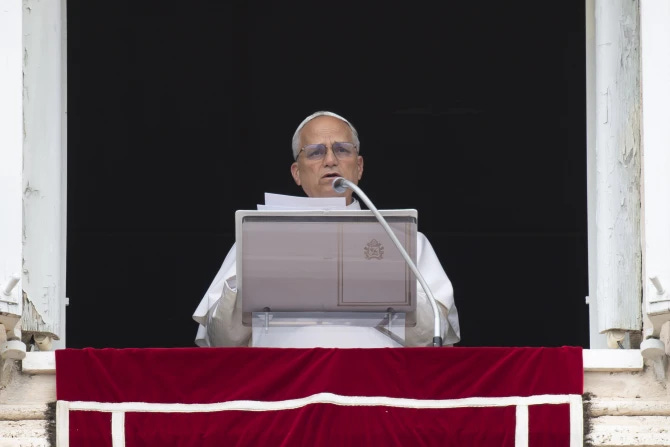"Let Diplomacy Silence the Weapons," Pope Leo Says After U.S. Bombs Iranian Nuclear Sites
The international community has a "moral responsibility to stop the tragedy of war," the pontiff said.
This story has been updated.
By Gary Gately
Hours after the U.S. bombed three nuclear sites in Iran, Pope Leo XIV delivered an urgent plea for diplomacy and peace Sunday, warning that the war could escalate into an “irreparable abyss.”
“Today more than ever, humanity cries out and invokes peace,” Pope Leo told thousands of people gathered in St. Peter’s Square after he recited the Angelus prayer.
“It is a cry for responsibility and reason, and it must not be drowned out by the roar of weapons and rhetorical words that incite conflict,” he said. “Every member of the international community has a moral responsibility to stop the tragedy of war before it becomes an irreparable abyss.”
The first U.S. pope’s comments came hours after President Donald J. Trump announced that U.S. warplanes and submarines had attacked three key nuclear sites in Iran. Trump claimed on social media Sunday evening that the attacks inflicted “monumental damage” on the nuclear sites, but U.S. defense officials have said they’re still trying to determine the extent of the damage.
With the strikes, the U.S. directly entered into Israel’s war with Iran, stoking fears of further escalation in the Mideast as world leaders’ delivered urgent calls for diplomacy.
Iranian Foreign Minister Abbas Araqchi called the U.S. attacks a “grave violation” of the United Nations Charter, international law and the international Nuclear Non-Proliferation Treaty. In a post on X (formerly Twitter), Araqchi said the strikes “are outrageous and will have everlasting consequences,” adding that “Iran reserves all options to defend its sovereignty, interest, and people.”
Israel and Iran continued trading attacks into early Monday.
Pope Leo has repeatedly appealed for peace and diplomacy to prevent the conflict from escalating into a wider war since Israel first attacked Iran on June 13.
The next day, he urged Israel and Iran to act with “responsibility and reason” and seek peace through dialogue. He specifically referred to “the commitment to build a world that is safer and free from the nuclear threat,” which he said must be pursued not through force, but “respectful encounter and sincere dialogue, in order to build lasting peace, founded on justice, fraternity and the common good.”
On Sunday, the Holy Father lamented that “alarming news continues to emerge from the Middle East, especially from Iran.”
“In this dramatic scenario, which includes Israel and Palestine, the daily suffering of the population — especially in Gaza and other territories — risks being forgotten, even as the urgency for proper humanitarian support becomes ever more pressing,” Leo said.
In several public appearances since his election, including in his first Sunday message on May 11, Leo has called for Israel to allow desperately needed humanitarian aid to flow into Gaza and for an immediate ceasefire and the release of all Israeli hostages held by the militant Islamist group Hamas.
Iran has supplied Hamas with rockets, weapons technology and training during Israel’s war with Hamas. The war erupted after Hamas’ October 7, 2023, cross-border terrorist attack killed about 1,200 Israelis and militants seized about 250 hostages, of whom dozens remain captive.
The Palestinian death toll in the 20-month war has surpassed 55,000, according to Gaza’s Health Ministry, which does not distinguish between military and civilian casualties. And Israel’s blockade has left most of the population of more than 2 million Palestinians to the brink of famine and lacking healthcare and other necessities, according to the UN and aid workers.
Israel said it launched “preemptive” strikes on Iran on June 13, targeting Tehran’s nuclear sites and military leadership. Israeli Prime Minister Benjamin Netanyahu asserted that Iran is close to developing a nuclear weapon, posing a threat to Israel’s “very survival.” But Iran, which has repeatedly threatened to annihilate Israel, insists its nuclear program is purely peaceful.
Netanyahu, who had congratulated Trump for his “bold decision to target Iran's nuclear facilities,” told reporters in a pre-recorded address Sunday that Israel would stop targeting Iran when it eliminates “the two concrete threats to our existence: the nuclear threat and the ballistic missile threat.”
“We are moving step by step towards achieving these goals,” he said. .”We are very, very close to completing them.”
More than 400 people have been killed in Iran and more than 3,000 wounded since Israel launched its attacks on June 13. Israel reports that Iran’s strikes have killed at least 24 people.
Israel’s initial attacks came a day after Iran said it had built and activated a third nuclear enrichment facility immediately following the United Nations International Atomic Energy Agency’s censuring Iran for violating a global nuclear nonproliferation treaty.
On Sunday, UN Secretary-General António Guterres warned during a meeting of the Security Council that the U.S. attacks on Iran’s nuclear sites represent a “perilous turn” in the volatile region.
“We now risk descending into a rathole of retaliation after retaliation,” Guterres said. “To avoid it, diplomacy must prevail.”
Pope Leo shared that sentiment.
“Let diplomacy silence the weapons; let nations shape their future through works of peace, not through violence and bloody conflict,” he said.
“There are no ‘distant’ conflicts when human dignity is at stake. War does not solve problems. On the contrary, it amplifies them and produces deep wounds in the history of peoples, which take generations to heal. No armed victory will be able to compensate for the pain of mothers, the fear of children, the stolen future.”



